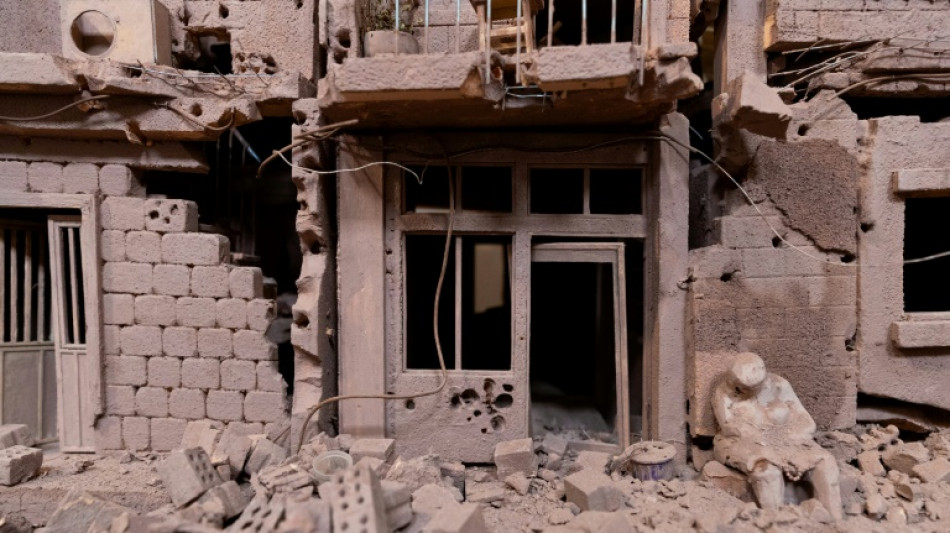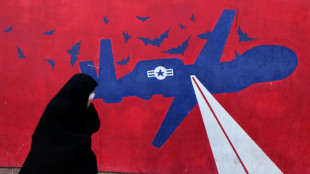
-
 Vonn to provide injury update as Milan-Cortina Olympics near
Vonn to provide injury update as Milan-Cortina Olympics near
-
France summons Musk for 'voluntary interview', raids X offices

-
 Stocks mostly climb as gold recovers
Stocks mostly climb as gold recovers
-
US judge to hear request for 'immediate takedown' of Epstein files

-
 Russia resumes large-scale strikes on Ukraine in glacial temperatures
Russia resumes large-scale strikes on Ukraine in glacial temperatures
-
Fit-again France captain Dupont partners Jalibert against Ireland

-
 French summons Musk for 'voluntary interview' as authorities raid X offices
French summons Musk for 'voluntary interview' as authorities raid X offices
-
IOC chief Coventry calls for focus on sport, not politics

-
 McNeil's partner hits out at 'brutal' football industry after Palace move collapses
McNeil's partner hits out at 'brutal' football industry after Palace move collapses
-
Proud moment as Prendergast brothers picked to start for Ireland

-
 Germany has highest share of older workers in EU
Germany has highest share of older workers in EU
-
Teen swims four hours to save family lost at sea off Australia

-
 Ethiopia denies Trump claim mega-dam was financed by US
Ethiopia denies Trump claim mega-dam was financed by US
-
Norway crown princess's son pleads not guilty to rapes as trial opens

-
 Russia resumes strikes on freezing Ukrainian capital ahead of talks
Russia resumes strikes on freezing Ukrainian capital ahead of talks
-
Malaysian court acquits French man on drug charges

-
 Switch 2 sales boost Nintendo profits, but chip shortage looms
Switch 2 sales boost Nintendo profits, but chip shortage looms
-
China to ban hidden car door handles, setting new safety standards

-
 Switch 2 sales boost Nintendo results but chip shortage looms
Switch 2 sales boost Nintendo results but chip shortage looms
-
From rations to G20's doorstep: Poland savours economic 'miracle'

-
 Russia resumes strikes on freezing Ukrainian capital
Russia resumes strikes on freezing Ukrainian capital
-
'Way too far': Latino Trump voters shocked by Minneapolis crackdown

-
 England and Brook seek redemption at T20 World Cup
England and Brook seek redemption at T20 World Cup
-
Coach Gambhir under pressure as India aim for back-to-back T20 triumphs

-
 'Helmets off': NFL stars open up as Super Bowl circus begins
'Helmets off': NFL stars open up as Super Bowl circus begins
-
Japan coach Jones says 'fair' World Cup schedule helps small teams

-
 Equities and precious metals rebound after Asia-wide rout
Equities and precious metals rebound after Asia-wide rout
-
Do not write Ireland off as a rugby force, says ex-prop Ross

-
 Winter Olympics 2026: AFP guide to Alpine Skiing races
Winter Olympics 2026: AFP guide to Alpine Skiing races
-
Winter Olympics to showcase Italian venues and global tensions

-
 Buoyant England eager to end Franco-Irish grip on Six Nations
Buoyant England eager to end Franco-Irish grip on Six Nations
-
China to ban hidden car door handles in industry shift

-
 Sengun leads Rockets past Pacers, Ball leads Hornets fightback
Sengun leads Rockets past Pacers, Ball leads Hornets fightback
-
Waymo raises $16 bn to fuel global robotaxi expansion

-
 Netflix to livestream BTS comeback concert in K-pop mega event
Netflix to livestream BTS comeback concert in K-pop mega event
-
Rural India powers global AI models

-
 US House to vote Tuesday to end shutdown
US House to vote Tuesday to end shutdown
-
Equities, metals, oil rebound after Asia-wide rout

-
 Bencic, Svitolina make history as mothers inside tennis top 10
Bencic, Svitolina make history as mothers inside tennis top 10
-
Italy's spread-out Olympics face transport challenge

-
 Son of Norway crown princess stands trial for multiple rapes
Son of Norway crown princess stands trial for multiple rapes
-
Side hustle: Part-time refs take charge of Super Bowl

-
 Paying for a selfie: Rome starts charging for Trevi Fountain
Paying for a selfie: Rome starts charging for Trevi Fountain
-
Faced with Trump, Pope Leo opts for indirect diplomacy

-
 NFL chief expects Bad Bunny to unite Super Bowl audience
NFL chief expects Bad Bunny to unite Super Bowl audience
-
Australia's Hazlewood to miss start of T20 World Cup

-
 Bill, Hillary Clinton to testify in US House Epstein probe
Bill, Hillary Clinton to testify in US House Epstein probe
-
Cuba confirms 'communications' with US, but says no negotiations yet

-
 Iran orders talks with US as Trump warns of 'bad things' if no deal reached
Iran orders talks with US as Trump warns of 'bad things' if no deal reached
-
From 'watch his ass' to White House talks for Trump and Petro


The exiled sculptor of 'all that is no longer there' in Syria
A Syrian neighbourhood targeted by regime bombing lies in ruins, with bodies and broken toys poking out of the rubble; tall, grey buildings are reduced to crumbling, empty shells, their walls blown away or pockmarked by the blast.
The scene, captured in devastating detail, has been created by artist Khaled Dawwa, a Syrian exile and prison survivor who now works in France.
In his colossal work entitled "Here is my heart!", Dawwa is still battling oppression, urging viewers "not to forget the revolution by the Syrian people and all their sacrifices".
"When I'm working on this piece in my studio, I'm in Damascus. I do everything I can here, while not being there...," the 36-year-old tells AFP.
Deeply scarred by the years of repressive rule and violent crackdowns and the loss of friends killed, missing or imprisoned, Dawwa's work is both an act of revolt and memory, targeting "the international community's inaction against dictatorial regimes" in Syria and elsewhere.
"In the face of the disaster that is happening in Syria, I feel a responsibility because I have the tools to express myself," he says.
Among several of his massive installations -- including one in bronze -- being exhibited for the first time this year in France, "Here is my heart!" has been on display in Paris and soon transfers to a big national museum.
- Bearing witness -
Dawwa began the piece in 2018, as regime forces retook the rebel bastion of Eastern Ghouta, on Damascus' outskirts.
At nearly six metres (nearly 20 feet) long and more than two metres high, it is imposing.
Using polystyrene, earth, glue and wood, covered in clay, he details the destruction inside and out -- the shattered doors, blown-away balconies, right down to the overturned chairs.
In the debris, crunched-up bicycles and the wreckage of a bus can be seen -- but also the bodies of a child lying next to his ball and of an old woman.
"It's totally unique and innovative," says philosopher Guillaume de Vaulx, of the French Institute for the Near East (Ifpo) and co-author of "Destructiveness in Works. Essay on Contemporary Syrian Art".
"Artists have shown destroyed things and made it their art, but he shows the process of destruction from within," de Vaulx adds, speaking from Beirut.
"He stops before the form has totally disappeared but the viewer is inevitably led to imagine the moment when everything will crumble..."
- 'Broken memories' -
Themes pitting people against authority dominate the works of Dawwa, who graduated from Damascus' School of Fine Arts.
From the onset, he took part in the nationwide anti-government protests that began in 2011, before joining other artists and activists to set up an independent cultural centre in Damascus, initiated by Syrian actor Fares Helou.
Despite police pressure, Dawwa continued to demonstrate and work at the centre for three years. By 2013, he was practically the only one left there.
"My battle was to not abandon the project, otherwise it was as if we were giving up hope," he says.
It was during that period he came to understand the impact his sculptures could have.
Posting a photo of his work on Facebook, he was surprised to see it shared hundreds of times.
Although risky, he continued to create and post pictures, but then destroyed the sculptures "in order to leave no trace", he says.
Then, in May 2013, he was seriously wounded in his studio by shrapnel and, on leaving hospital, jailed, spending two months in various prisons.
"There were thousands of people. Every day, at least 10 would die," he says.
"Their bodies would stay for two days next to us, no one removed them from the cell... on purpose."
Of the horror of the experience which still gives him nightmares, he says: "They broke the memories in my head."
After his release, he was forced into the army but escaped beforehand, fleeing to Lebanon, then to France in 2014 where he was granted refugee status.
- 'Rebuilt our history' -
His street-scene artwork, he says, is an attempt to convey "all that is no longer there; families, memories".
The Syria conflict, which broke out in 2011, has killed close to half a million people and spurred the largest conflict-induced displacement since World War II.
Veronique Pieyre de Mandiargues, a founding member of France's Portes Ouvertes Sur l'Art association, which supports artists in exile, said Dawwa "wanted to create a fixed image of what was happening in Syria so that it remains in our memories".
Lifting her hand to her heart, Syrian psychoanalyst Rana Alssayah, 54, also a France-based refugee, expresses her emotions on first seeing the piece.
"The magnitude of the destruction that Khaled has recreated, it's so real... I couldn't look at all the details inside the buildings, it was too hard."
Through this work, "he is saying the sorrow and pain that we can't talk about, he has rebuilt our history."
R.Halabi--SF-PST

